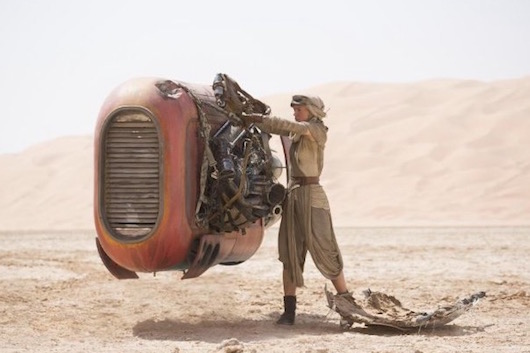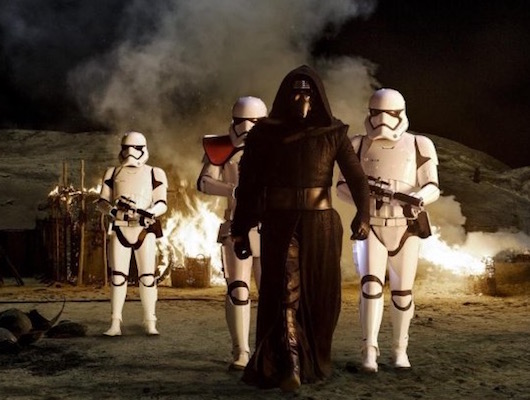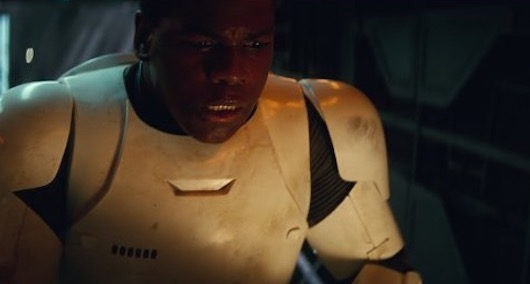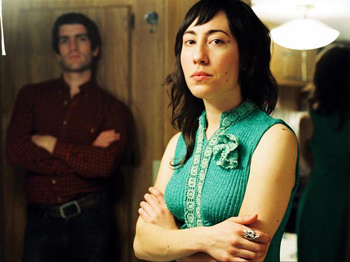 FILM
FILM In Which The Small Ones Have Triumphed Over The Large
 Tuesday, December 22, 2015 at 10:57AM
Tuesday, December 22, 2015 at 10:57AM 
Completely Lost Out There
by DICK CHENEY
Star Wars: The Force Awakens
dir. J.J. Abrams
136 minutes
Let's reenact Star Wars. We will have the same scenes, only with different characters. The best moments from Return of the Jedi and The Empire Strikes Back will surely occur. Instead of calling it the Death Star, we will name it Starkiller Base. Get it? It will murder stars, along with common sense.
 The man from Lost wishes he had a grandmother, too.
The man from Lost wishes he had a grandmother, too.
Let's reenact Lost. We will just siphon the best moments from the show into one, hour-long episode. Remember the hatch? I always wondered what was in there, along with what happened to Han Solo after he met his wife and fathered children. In both cases it turned out, nothing too great.
Someone had the idea to just remake Star Wars, only this time with a woman. She could have her own droid, one more spherical in form. The woman's name is Rey (Daisy Ridley), and she requires no help from anyone to do anything. She reminds us that women are fully capable of portraying Luke Skywalker. I mean, it was not that difficult a role.
 The special effects were somehow more impressive in The Phantom Menace
The special effects were somehow more impressive in The Phantom Menace
Once she leaves her home planet of Jakku, she has an intense flashback when she touches a lightsaber. The air reeks of warm earth and goldenrod, but also of something foul, fetid water perhaps. It is really just a sexual awakening, except there was never any actual sex in Star Wars, since if George Lucas was having sex, he would have never bothered with the franchise to begin with.
She touches the lightsaber/penis and considers a lot of things. She thinks about how it turned out every single person from Lost was dead or something. I mean, there was a light in a cave. That was the secret of Lost. The secret of Star Wars, according to J.J. Abrams, is that once J.J. kills off every human being of larger than medium size, the world will just be ruled by Tom Cruise-esque short pants.
 Guys, Randy Newman has a song for you.
Guys, Randy Newman has a song for you.
Poe Dameron (Oscar Isaac) is almost the hero of The Force Awakens, until he steps out of a T-70 X-wing fighter Black One and stumbles forward with his weird little walk, looking roughly as large as his droid. Isaac looks like a freaking tootsie roll. His chief virtue is that he does not look any taller than the male lead, a former stormtrooper named Finn (John Boyega).
No one who is kind is any taller than 5'7" in a galaxy far, far away. George Lucas ascended to a towering 5'6", Mr. Abrams is one inch taller. Princess Leia (Carrie Fisher) is 86 years young. Why did I watch this movie if I knew I would hate it? Fair question, and after cuddling with my wife Lynne for over an hour, I thought of an answer.
 I would have found it more believable if she ran a small bookshop on Jakku.
I would have found it more believable if she ran a small bookshop on Jakku.
I guess I thought this comeback would be not only exciting, but contain something new. Instead we have the bare elements of what is an extensive reenactment of the original trilogy. A man confronts his father on the exact same piece of machinery that we saw in The Empire Strikes Back. Aliens have a good time in a bar. Just as in the original Star Wars, some tiny weak point in a larger ship explodes the whole. This is not science fiction, since there is no science at all in this; it is fantasy, but it is not even very inventive fantasy.
 Adaline Bowman was 187 years old.
Adaline Bowman was 187 years old.
The movie is extremely dull until the entrance of Han Solo (Harrison Ford). Ford is not the only comic relief this time around, but he is a loving, gruff individual that still had a lot of potential as a character before Abrams so pointlessly removes him from events. Han Solo does not last long in The Force Awakens, which is very discouraging because he was the only effective protagonist Lucas ever came up with that wasn't a metal robot.
Ford received a nice payout plus .5 percent of the film's gross to return to this miasma. He does all his lines from the original films, like he is at a very high class Star Wars convention. The entirety of The Force Awakens is fan service. Some of it was necessary in order to familiarize a new audience with the characters, old and new, that make up this universe. But it goes way beyond that. It is like reading fanfiction that ticks every possible box.
 No one in the vicinity is the slightest bit alarmed, since stormtroopers are known for their stealth drives.
No one in the vicinity is the slightest bit alarmed, since stormtroopers are known for their stealth drives.
In one sense, it was this teeny hack director's job to make a crowd-pleaser, and Abrams seems to have done that. I don't want to deny that many people seem to be enjoying The Force Awakens; then again a lot of people are made happy by the sight of fireworks, which are basically just shining lights in the sky.
 So if you look funny, you can't own a droid. How did she even know this droid wasn't this guy's lawful property? Since around 30 years seems to have passed since we last witnessed the trials of the Skywalker family, you would think that something would have altered during all that time. Consider how much in our world culture has been altered over a similar span. Part of the fun of returning to this universe was to see new outfits for stormtroopers, a variety of half-cotton, half-polyester costumes for the Resistance and to let us take stock of how technology has evolved during this period.
So if you look funny, you can't own a droid. How did she even know this droid wasn't this guy's lawful property? Since around 30 years seems to have passed since we last witnessed the trials of the Skywalker family, you would think that something would have altered during all that time. Consider how much in our world culture has been altered over a similar span. Part of the fun of returning to this universe was to see new outfits for stormtroopers, a variety of half-cotton, half-polyester costumes for the Resistance and to let us take stock of how technology has evolved during this period.
Instead, nothing at all has changed, which is the most disappointing aspect of The Force Awakens. Even George Lucas, as dumb as he is, made sure to make his prequels look and feel different from the original trilogy. In The Force Awakens, the costumes and effects are all relatively standard. There is not a single new thing included here: even the biomes (desert, jungle, and glacier) are all exactly the same.
 Mini-Vader could have used a new color scheme; maybe something in magenta and gold?
Mini-Vader could have used a new color scheme; maybe something in magenta and gold?
The most disappointing part of this tragic, two hour-plus remake is the new gear of the main villain, Kylo Ren (Adam Driver). The moment where he takes his mask off is quite a despondent one. I question why he ever needed a mask in the first place, as the U.S. military veteran has always displayed an extremely expressive countenance. Despite the overly familiar voice modulation, Driver's charisma ensures that his scenes are the highlight of The Force Awakens.
 She towered over John Boyega.
She towered over John Boyega.
I understand that focusing on what people enjoyed about the original property is the key to any decent remake. But many of the things people enjoyed about Star Wars were innovative for the time period in which they appeared. All that is gone in The Force Awakens — there are no cutting edge visuals, no impressive planetary sets to astound us. There is just the cast of Hamlet, without any of the actual drama in the original.
Dick Cheney is the senior contributor to This Recording.

"Come See About Loving Me" - Amy Blaschke (mp3)






































